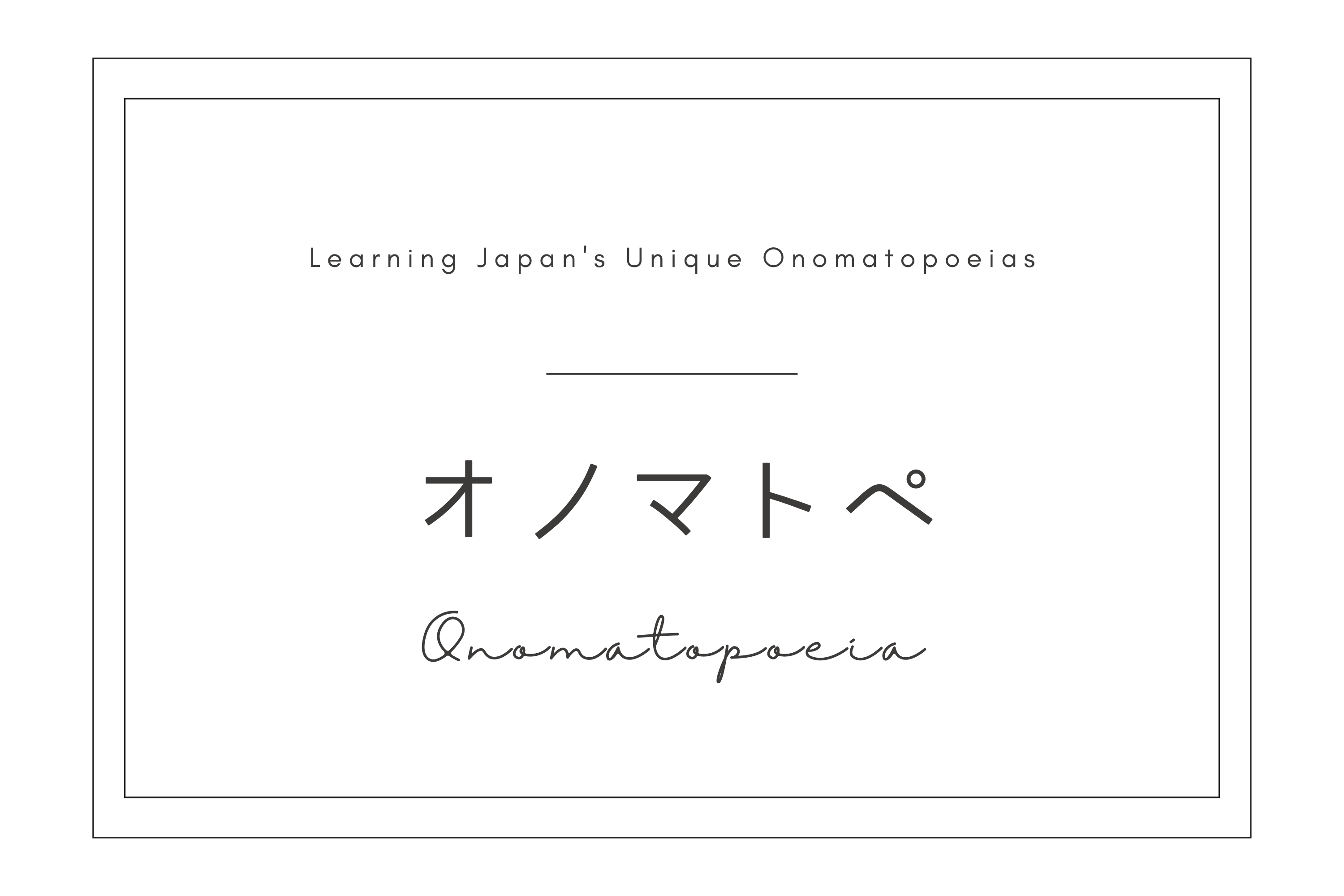
Introduction
Have you ever noticed expressions like "ざわざわ (zawa-zawa)," "ドンッ (don)," or "ガーン (gān)" that aren't part of the characters' lines when reading your favorite manga in Japanese? These are called "onomatopoeia," which are used to describe sounds, voices, someone or something's current state and/or condition. Nowadays, many types of onomatopoeia are used on Japanese social media, and you can even find them in LINE stickers.
In English, it is common to use various verbs to describe how one cries, such as "cry," "sob" or "whimper." However, in Japanese, onomatopoeia are commonly used to express these differences, such as "めそめそ泣
く (meso-meso naku)," "わんわん泣
く (wan-wan naku)," "しくしく泣
く (shiku-shiku naku)" and so on. As you can see, the Japanese language is full of onomatopoeia.
For this article, I will be introducing onomatopoeia that can be used to express one's feelings. Why not expand your vocabulary and increase your range of expression by learning them?
First, I would like to begin by introducing expressions that are used in a positive sense.
わくわくする (Waku-waku suru)
The word "わくわくする" means to be excited, thrilled, or restless because you are expecting a pleasant and joyful event to happen. An expression similar to "わくわくする" is "どきどきする (doki-doki suru)," but these two have slightly differing meanings. "どきどきする" represents the heart beating fast due to anxiety, fear, or surprise; imagine your heart beating quickly in such a situation. After going through an intense workout session, your heart beat increases, right? That sensation can also be expressed as "どきどきする."
For example, how would you feel the day before going out on a date with someone you like? You may feel both excited "わくわくする" and nervous "どきどきする" at the same time.
【Example】明日
の旅行
が楽
しみで、わくわくしている。(Ashita-no ryokō-ga tanoshimide, waku-waku shiteiru.)
【Meaning】I am excited and looking forward to my trip tomorrow.
ほっとする (Hotto suru)
"ほっとする" is an onomatopoeic word that expresses a feeling of relief. "ほっ" can also indicate exhaling or sighing heavily.
【Example】大
きな仕事
が無事
に終
わって、ほっとした。(Ōkina shigoto-ga buji-ni owatte, hotto-shita.)
【Meaning】I felt relieved now that the major project had been completed without any issue.
Now, let's look into expressions that have negative meanings:
がっかりする (Gakkari suru)
The word "がっかりする" expresses a feeling of disappointment, either because one's hopes have been shattered or one's expectations were let down. For example, if you fail the JLPT, you may feel depressed and upset. This onomatopoeia is perfect for expressing that feeling.
【Example】コンサートが中止
になって、がっかりした。(Konsāto-ga chūshi-ni natte, gakkari shita.)
【Meaning】I was disappointed that the concert was cancelled.
ひやひやする (Hiya-hiya suru)
"ひやひやする" expresses how a person is feeling anxious or afraid. It is written as "冷
や冷
や" in kanji, and is used when the feeling of dread or fear is so strong that one feels a chill go down their spine. For example, it can express the tension felt when you are in a room filled with a hostile atmosphere, as if a fight is about to break out, or the feeling of being in a car that is running low on gas. The cold sweat that comes out in these kind of situations is called "冷
や汗
(hiya-ase; cold sweat)."
【Example】彼女
に嘘
がバレるのではないかとひやひやした。(Kanojo-ni uso-ga barerunodewa naikato hiyahiya-shita.)
【Meaning】I was terrified that she was going to catch me in the act (of lying).
いらいらする (Ira-ira suru)
"いらいらする" is an onomatopoeia that expresses the feeling of anger. It means that one's nerves are on edge when things do not go the way they want them to, or when they are displeased with something. In kanji, it is written as "苛苛
する." The word "苛
" is derived from the word "thorns" from plants, and the unpleasant feeling of being pricked by a thorn is expressed as "いらいら." If you feel irritated, first take a deep breath to calm yourself down.
【Example】時間
になってもバスが来
なくていらいらする。(Jikan-ni nattemo basu-ga konakute iraira-suru.)
【Meaning】I was getting irritated as the bus didn't show up on time.
くたくた/へとへと (Kuta-kuta, Heto-heto)
"くたくた" is an expression indicating that one is exhausted, one's body feels weak (from exhaustion), or drained of energy. It can express the feeling of fatigue after a full day of hiking or after a hard day's work. Another onomatopoeia that has a similar meaning is "へとへと." However, "くたくた" can also be used to describe how clothing and other items have become old and has lost its firmness or elasticity.
In addition, unlike the expressions that I previously mentioned, "くたくた" and "へとへと" are not used with the verb "する (suru)". Instead of "くたくたする (kuta-kuta suru)", you will need to use "くたくただ (kuta-kuta da)"; and instead of "へとへとする (heto-heto suru)," you need to use "へとへとだ (heto-heto da)."
【Example】トレーニングがきつかったので、くたくたに疲
れた。(Torēningu-ga kitsukatta-node, kutakuta-ni tsukareta.)/へとへとだ。もう歩
けない。(Hetoheto-da, mō arukenai.)
【Meaning】The training was so intense that I now feel tuckered./I am exhausted. I can't walk anymore.
【Example】着古
してスーツがくたくたになった。(Kifurushita sūtsu-ga kutakuta-ni natta.)
【Meaning】My business suit is worn out and tattered.
Summary
It is difficult to express complex feelings in words, let alone when it is not in your native language. I am sure that it is even harder to find the right words to describe your feelings in Japanese. As I mentioned at the beginning of this article, there are many different types of onomatopoeic expressions in Japanese. Since there are so many feelings that can be expressed, I encourage you to try using them when you want to convey your emotions such as joy, grief, and so on.
